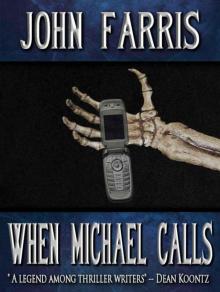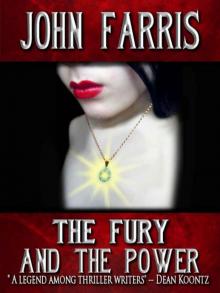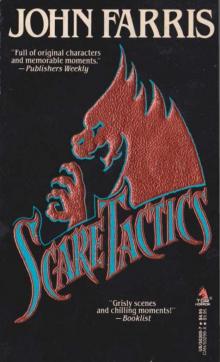- Home
- Farris, John
Captors Page 12
Captors Read online
Page 12
"Oh, it was just a squall. Ripped the canvas some. But I'm still right side up." She sniffed. "Do I look streaky?"
"Not so bad. You look wonderful to me."
"Thanks," she said shyly.
"Kevin's got a plane to catch bright and early, so—"
"Just down to the Village and back. It's his last night home for a while, and I wanted to treat him. Monday night, there'll be people around, there's nothing to worry about."
"We cabled the Dowds this morning, but I think we'll put in a call tomorrow. I know they won't believe you're safe until they hear your voice."
She grinned. "Such as it is." She got up, kissed her mother quickly. "Kevin'll take all night combing his hair if I don't grab him. See you." She went up the back steps, favoring one hurt foot slightly, humming something, and a couple of seconds later Felice heard her croak as loudly as she could, "Kev-uhhnn! Let's go-oh!"
Felice smiled to herself, contented. A little of the buttermilk was left in her glass. She snubbed out the cigarette, picked up the glass, decided she didn't want the rest of the milk, carried the glass to the sink.
Sam's typewriter had stopped. It was marvelously quiet in the house now: all sound was external. She heard a barn owl. She listened to the tireless frogs on the shores of the pond. She still felt pleasantly stimulated from the exercise, a shade too tense to settle down right away to a book or neglected letters. Through the six-over-six window above the sink she saw Riggs stride across the lawn, through shadow clusters and cold widths of moonlight, his eyes quick amber, searching idly at every pause.
Felice was about to rinse out the glass when a tremor in her hand caused it to slip. The glass shattered in the sink. She stared at the pieces, feeling a bleak insecurity. Too much demand on the nerves, she thought. Tonight they would all sleep very well indeed with Carol back.
The bleakness settled in like a fog.
Carol was home. But she was changed, had been changed. There was a wrongness in her eyes, trouble there, too deep to see clearly, or to guess at. Simply there.
What had she seen, or could not tell?
Felice trembled. There was blood on one fingertip, running darkly down to the palm of her hand. She washed it off and cleaned up the broken glass.
The tape recorder was turned off after they'd twice heard every word the girl had to say, and for several minutes the two men sat in a smoky contemplative silence occasionally broken by short messages on the Telex.
Pete Demilia yawned. "That blow on the neck huskied her voice up pretty good."
Gaffney said, "Massive internal swelling, some glands affected, according to the examining physician. She'll be speaking normally in a few days."
"What caused that bruise? A fist?"
"No. He was positive about that. She could have been garroted a certain way, maybe hit with a club or something." Gaffney frowned, looking at the two-page transcript of a telephone report from the FBI lab.
"Do you think she's telling the truth? Is she drawing a blank?"
"If she's a liar, she's a damned good one." He handed over the transcript. "This corroborates our suspicion that they were doping her—combination of Methedrine, a tranquilizer and a potent hypnotic drug, one so new the lab had trouble identifying the source. The drug is currently being manufactured in small batches for controlled testing purposes. A company in Palo Alto holds the patents and makes the stuff."
"Hey, hey," Demilia said, eyes lighting up.
"De La Cruz will be working all night on the Coast. We should know within an hour if a quantity of the drug was stolen recently. If not—"
"Someone working for the company who has access could have pinched just enough for Carol Watterson. A chemist, maybe? It looks like a break might have come our way."
Gaffney had the habit of smoking every cigarette down to the half inch, but tonight he was so keyed up he stubbed out one only a third gone. "We've had a couple of breaks so far. Keeping the papers off the story was one. Getting the girl back was a colossal break."
"Yeah," Demilia said, and they were both quiet again. Demilia smiled slightly. "Changed your vote; Gaff? I still say she escaped. It doesn't make sense otherwise. The kidnappers were thorough. They had a good plan and they stuck to it. They spent money on this snatch. They weren't holed up in a third-rate motel somewhere, bet on that. We won't find them, or find out where they were, by the usual methods, checking the summer rentals and the utilities and so forth. But why should they grab her, then let her go more than five days later, without having made the slightest effort to collect their money?"
"Because they got something they wanted. Something Carol had. It wasn't money."
"It wasn't her beautiful body, either."
"This is far out. Maybe it was an experiment, a dry run. A practice kidnapping."
Gaffney picked up a photograph of Carol, not a studio portrait but a good candid color shot taken by a professional. The photo was a year old. Her face had been rounder then, more youthful. Her gaze was direct, smile expressing a certain optimism and sense of well-being. Not the same girl now, not quite the same face. Tonight the skin of her face had been as taut as a drumhead; she wasn't starved looking, but there was no excess flesh, and her expression had changed, subtly. Blame the loss of optimism too, the hard-gained realization that the world was still a hunting ground and anyone could be a victim. Her eyes had looked tighter to him, more sharply defined and barely recessed, but they were still appealing and wise, filled with flashes of warmth and excitement. "When do you see her again?"
"Tomorrow," Gaffney said, and was immediately aware of how much he was looking forward to it.
"She'll help us redraw our suspect. Later we'll drive over to Rockland County and see if we can shake up her memory some."
"That's when we spring the big surprise?"
"That's when we spring it."
Demilia smiled uneasily. "I hope she doesn't have a bad heart to go with her bad memory."
"The doc says she's as sound as a dollar, Pete."
Kevin had turned the bed light out at last but he didn't touch the transistor radio on the pillow next to his ear. It was a bright, clear night. He wasn't even a little tired, although the disc jockey had just babbled gleefully that the time was twenty-six minutes to three. Then, with a catch in his voice, he reverently introduced the current Big One by The Doors. Kevin half listened; the radio was for company mostly. He was restless from anticipation, thinking fitfully of the long flight in a few hours, the blue-water cruise to follow. He was a little worried about the fit of the new facemask Sam had picked up for him at A&F. He wondered if Joey Balfour would get bored and goof off in the middle of the cruise and foul up their experiment, which depended upon keeping precise records of water temperature and salinity. He was glad nobody knew about the kidnapping; he wouldn't have to keep talking about it for thirty days. And he was glad he was going away right now, and wouldn't have to see Carol for a while.
If he never saw her again, Kevin thought, his eyes stinging, never, that wouldn't make any difference to him.
"Hey, your radio's loud," his mother said from the doorway, and he reached over instantly to turn it off. She came in and sat on the edge of his bed. She was smoking. "No sleep for you, either?" she asked softly.
"No."
"Keep you company for a minute?"
"Carol's restless too. I heard her walking around in her room a little while ago."
Kevin said nothing.
"The two of you were gone for quite a while tonight," Felice observed. "Gave Sam and me the jitters." He was lying on his back staring at the ceiling, face immobile, eyes like gray water, like reflecting pools. Plainly he didn't want to talk. He was worried about something, or mad, or both; she could never be sure of his moods. "Where did you kids go after you ate?"
"We drove up the Parkway," Kevin said, vocal at last.
"You must have had a lot to talk about." She looked obliquely at him over the tip of her cigarette and was mildly concerned. "Did Carol�
�have anything to say about the kidnapping?"
The word acted on him like a prod; Kevin shifted in the bed, acutely uncomfortable; then he sat up, long arms around his knees, forehead just touching. Felice saw that he had failed to get his hair trimmed; it was beginning to get unpleasantly matted.
"Just that she—" He shook his head, not sure of what he wanted to say, or if he wanted to say anything. He decided to plunge ahead. "We talked a lot about the assassinations—about Martin Luther King and the Kennedys. Carol was mad about it. She said all the wrong people were being killed, the world had just gone completely wrong and out of focus and hate was choking us all like smog. She said it would be better for everyone to be on stuff—maybe that was the only way."
"Stuff?"
"Drugs, I guess she meant. Speed."
"What's speed?"
Kevin said impatiently, "It's a stimulant; you know, like bennies—Benzedrine—only it eats your brains up after a while. Gaby Broyer's mother takes them. Everybody says she's a speed freak. Everybody knows it."
"I don't know it, pal. What else did Carol—"
"She said that when you're on stuff then you can't hate, you don't want to kill. But the people whose whole life is hating have twisted the drug thing and made it seem evil, because they twist everything that's good into evil, for their own purposes."
Felice shook her head slowly. "Carol has better sense than to believe that."
"We were parked by then. She was shaking. I thought she was just mad. But she said, 'I'm lucky; anything could have happened to me by now. I'm lucky, but I'm scared too.' She asked me if I would hold her, and I did, and then she—sort of laughed and said now that I was getting to be man-sized I would have to learn how to hold a girl better than that."
"Listen to your sister, she knows."
Kevin scowled at her, which surprised Felice. "She held me—pretty tight, for a long time, until she stopped shaking so much. She kissed me too. Twice." His voice had dropped to a low monotone.
"Oh?" Felice said, with a slight smile he couldn't see.
"Then she said, 'Thank you, Kevin. I feel a little better.' Then she started the car but we didn't go, she just looked at me kind of sad and said would I do a very—special favor and sleep with her tonight, because she felt lonely and depressed and didn't want to be alone."
"Sleep in the same bed, you mean? How did you feel about that? What did you tell her?"
Kevin said dully, "I didn't say anything. Carol said it would be all right, that brothers and sisters who are close like we are sleep together sometimes and there isn't anything wrong with it."
"Often there isn't. But you felt wrong."
Kevin shrugged, painfully.
"Well, I'm sure Carol understood."
"I guess so."
Felice finished her cigarette and put it out in the ashtray she'd brought along. She stood up. "Everybody but Sam seems to be hard up for sleep tonight. Maybe if I clear out you might get a few winks."
"Maybe," Kevin muttered, not moving. "Good night."
"Good night."
In her own room Felice thought about it, and wondered why she felt obscurely wrong, as Kevin did. She had sensed deep anger in him, outrage, and that troubled and mystified her. Was he so offended because Carol had wanted to be near him? It was not an offensive thing, and he must realize that. Or had Carol said or done something else that—
Felice shied from the suggestion that touched her mind, then returned to it cautiously. Could Kevin have been innocently aroused by an embrace at his age, by a sisterly kiss on the cheek? He was half-grown, had reached a certain stage of curiosity and awareness. Such an experience might have caused guilt feelings, which would explain his present state of mind.
Above her she could hear the give and creak of floorboards; Carol was still awake.
Felice took off her peignoir, turned out the lamp, settled down in bed, her eyes big in the dark. Her explanation made sense, she thought, still uneasy.
Because the other made no sense at all. Carol would not knowingly try to seduce her brother, degrade them both in such a way. Not the Carol they knew.
Chapter Twelve
Monday, July 1
She looked tired when Gaffney came for her. She was wearing a deceptively expensive sleeveless knit dress in a vivid coral shade with a fabric belt in navy, white and coral, and she had knotted a navy scarf loosely at her throat. The scarf and the casual twist of pale hair over her right shoulder concealed the bruise. She wore French sunglasses with dark-gray lenses. For ornament she had chosen an antique gold bracelet. From what he'd observed so far Gaffney decided that Carol lacked the flair and dedication to costume of, say, a professional model, but she did know style, loved bright colors and dipped sparingly into the fads of the season.
"Carol, we could have put this off," he said, holding the car door for her.
"No point in that," she replied. "Thank you. What happens first?"
"We're still waiting on the man who did the original sketch of our suspect. He should be along in a couple of hours. In the meantime we could drive across the river."
"Cover all of Rockland County today?"
"Just one area we're interested in." Gaffney drove a couple of miles north to route 35, headed west to Peekskill, explaining on the way about the yellow paint found on the tires of the rented van.
"Uh-huh, FBI thoroughness." She leaned toward him to accept a light for her cigarette, sat back. "How many kidnappings does the FBI solve?"
"A high percentage. We're still working on a couple of old cases."
After a few miles she was more at ease with him. The day was a good one, hot but bearable with no humidity to speak of, a low bumpy rim of clouds on the horizon. "I suppose it's an old question, but how did you get into this line of work?"
Gaffney chuckled willingly. "Whores and cops always have to explain themselves. I do this work because I think it's important, and because I'm good at it."
"You don't seem like the type. I mean—it's kind of a grubby organization after all, with a good publicity mill."
He wasn't offended by her outsider's judgment. "We're not perfect. There are internal policies I find hard to live with, but I won't argue the necessity of having them. We have good agents and some indifferent ones; the bad ones are rare and we weed them out first. The pay isn't good even at my level and the paper work will drive you crazy at times. Overtime can be rough on a man who's conscientious about his family."
"How about your family?"
"We're scattered. My wife died six years ago. I have a boy who'll be finishing up at Notre Dame this year. My daughter is your age, twenty-one. She's married, lives in the city and studies design at the Fashion Institute. She has most of my features so she ought to be ugly as hell, but somehow everything works for her. I'd call her a beauty."
She stared appraisingly at him. "You're a long way from being an ugly man, Mr. Gaffney."
"Thanks. Bob, if you will."
They crossed the Hudson north of Peekskill. "I don't think I've been over this way in four or five years," she said, then added quickly, "that I remember. We used to have picnics at Bear Mountain. A long time ago I got lost in the woods for a whole afternoon. I was about five, I guess. My father was still living then."
At Stony Point Gaffney turned west on 210. "This is the road they may have taken, the evening they kidnapped you or later in the week. We'll go slow along here. Now if anything seems curious or vaguely familiar tell me and I'll pull off, give you time to think about it."
She said hesitantly, "I wish I knew what I was looking for." The road was well shaded by tall trees on either side; she took off her sunglasses. She was absorbed now, concentrating perhaps a little too hard. Traffic was light. They had entered Harriman State Park, a semiwilderness area. They saw boy scouts on a field trip, passed small lakes and campgrounds. It was ten degrees cooler here, and the effect of alternating light and shade caused her to nod sleepily. He reached out and touched her arm and she looked up, w
ide-eyed, with a guilty smile, then glanced out the window.
"They couldn't have kept me here. Not in the park."
"We're not far from Greenwood Lake. Dozens of likely hiding places along the shore, or back in the woods."
She yawned. "This time of the year Greenwood Lake has bigger crowds than Times Square."
"Maybe the people we're looking for have been part of the crowd for so long nobody notices them. Could you use some coffee?"
"Could I!"
They parked behind a frame-and-shingle luncheonette on a graveled point overlooking the narrow lake.
Half a hundred sailboats clung like moths to the mild, dark swells. On the opposite shore there were fine old summer houses with secluded porches, patriarchal shade trees, lawns that were meticulously clipped to the water's edge.
Gaffney looked at his watch. "I noticed a phone booth by the road. I'll take a minute to phone in first."
"Why not use your radio?"
"No good at this range." He got out and walked briskly away. Tanned kids in skimpy swimsuits and adults in sun-faded tatterdemalion were lined up at the take-out windows of the luncheonette. A white powerboat with a ski tow hurtled by a few yards offshore, bow whapping against the swells, clean-limbed youths indolently taking their summer-bum pleasures. She watched them, then got out her powder and lipstick and opened the compact.
She first saw it coming in the filmy round mirror of the compact. Half puzzled, she was motionless with the pink lipstick poised against her underlip. Then she turned her head to make sure.
A black unlettered VW delivery van. It stopped thirty or forty feet away across the gravel, partially screened by a couple of low dusty trees. The man on the passenger side glanced alertly at her, swung the door open, stepped out. He was tall and attenuated and bushy-haired and he wore bulbous sunglasses like the evil lord of the planet Crypto in a children's matinee thriller. He came toward her purposefully, single-mindedly, not hurrying. The effect on her was the same as if a lightning bolt had glanced off the car. She dropped the lipstick. Her throat locked. Her mouth opened in a soundless expression of dismay and her chin trembled for an instant. She opened the door and got out, lipstick squiggle down the front of her otherwise impeccable dress. She took a faltering step in his direction, fists clenched breast high. She could just see the driver of the van. Squat, dark, wavy-haired, wearing a blue shirt.

 Sacrifice
Sacrifice Wildwood
Wildwood Fury
Fury Captors
Captors When Michael Calls
When Michael Calls Fury and the Power
Fury and the Power Dragonfly
Dragonfly Scare Tactics
Scare Tactics